
Photo by Joe Carducci

The Submerged State Unbound
Joe Carducci
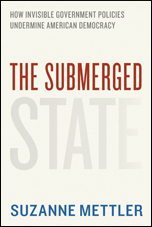 Last week Suzanne Mettler got onto the op-ed page of the New York Times with a strange bit of gloss on the size-of-government issue. Strange because she seems to think the problem is that the state isn’t getting credit for all its assistance payments to so nearly everyone that the government per se ought to be given a raise by unanimous acclaim, instead of being pressed for excuses and reform. Her piece is titled, “Our Hidden Government Benefits.” But her book we’re told is called The Submerged State: How Invisible Government Policies Undermine American Democracy. She writes as a “professor of government at Cornell”:
Last week Suzanne Mettler got onto the op-ed page of the New York Times with a strange bit of gloss on the size-of-government issue. Strange because she seems to think the problem is that the state isn’t getting credit for all its assistance payments to so nearly everyone that the government per se ought to be given a raise by unanimous acclaim, instead of being pressed for excuses and reform. Her piece is titled, “Our Hidden Government Benefits.” But her book we’re told is called The Submerged State: How Invisible Government Policies Undermine American Democracy. She writes as a “professor of government at Cornell”:
“The submerged state obscures the role of government and exaggerates that of the market. It leaves citizens unaware of the source of programs and unable to form meaningful opinions about them. Until political leaders reveal government benefits for what they are by talking openly about them, we cannot have an honest discussion about spending, taxes or deficits.” (NYT)
That’s pretty rich. For professors of government apparently, all votes purchased ought stay bought. Anything else is ipso facto Ignorance. She must assume that taxes would simply rise with the electorate’s knowledge of what it’s getting for its money. I’m no professor of government but I can tell Frau Mettler that if she’s going to wait for politicians to talk openly about anything she will in all likelihood be buried within her submerged state.
Also in the Times last week is a piece called “How Do You Say ‘Economic Security’?”, written by the co-authors of a book called, America’s Misunderstood Welfare State: Persistent Myths, Enduring Realities. One dude is “professor emeritus of public policy” at Yale, the other merely a professor of law at Yale, yet they get along swimmingly as they seek to lull the American populace into not defending itself against exemplars of our class of selfless yet well-paid professionals who realize and understand what is best for us in our hopefully illusory Democracy or Republic. In Mssrs. Marmor and Mashaw’s single shared opinion:
“[T]here is a crucial difference between then (Great Depression) and now (Great Recession): the words that our political leaders use to talk about our problems have changed. Where politicians once drew on a morally resonant language of people, family and shared social concern, they now deploy the cold technical idiom of budgetary accounting.” (NYT)
 The whole column is sophistry, maybe worse. It’s hard to imagine information professionals being so sealed inside their comfort zone. They continue, “In 1934, the government was us. We had shared circumstances, shared risks and shared obligations.” I’ll quote Tonto here: “What’s this we shit, Kemosabe?” Perhaps the Times editors neglected to explain to these jokers that they might not want to address Times readers as they do freshmen Yalies sleeping through Introduction to Governing-101. Their 1930s dream is what changed this country but this they do not want credit for. My mother’s family was a large German Catholic one on the northwest side of Chicago -- ten kids and she was one of the younger ones. The grown kids worked and got sausage for breakfast, the young ones got a piece of bread wiped in the grease. Mom’s dad sold coal in Chicago and died in his early fifties. This allowed us the good fortune of having her mother, born in 1894, to live with us when I was growing up. They read the Tribune and like the Colonel my grandfather cursed FDR and his welfare programs for what they would do to folks like them, though on the face of it they themselves could have used the money. What they understood that the social engineers did not was that these programs changed not people then, but would mess with generations thereafter. Marmor and Mashaw wish to engineer plenty but they, like regular Straussians, do not want that to be seen as anything but as caring, loving, altruistic “self-rule.” The manner in which they present their advice makes one wonder what’s in it for them. Are they part of the booming class of something like an Academic-Administrative complex? Or do they just want what’s best for us given that our own parents, never mind us, don’t have a clue.
The whole column is sophistry, maybe worse. It’s hard to imagine information professionals being so sealed inside their comfort zone. They continue, “In 1934, the government was us. We had shared circumstances, shared risks and shared obligations.” I’ll quote Tonto here: “What’s this we shit, Kemosabe?” Perhaps the Times editors neglected to explain to these jokers that they might not want to address Times readers as they do freshmen Yalies sleeping through Introduction to Governing-101. Their 1930s dream is what changed this country but this they do not want credit for. My mother’s family was a large German Catholic one on the northwest side of Chicago -- ten kids and she was one of the younger ones. The grown kids worked and got sausage for breakfast, the young ones got a piece of bread wiped in the grease. Mom’s dad sold coal in Chicago and died in his early fifties. This allowed us the good fortune of having her mother, born in 1894, to live with us when I was growing up. They read the Tribune and like the Colonel my grandfather cursed FDR and his welfare programs for what they would do to folks like them, though on the face of it they themselves could have used the money. What they understood that the social engineers did not was that these programs changed not people then, but would mess with generations thereafter. Marmor and Mashaw wish to engineer plenty but they, like regular Straussians, do not want that to be seen as anything but as caring, loving, altruistic “self-rule.” The manner in which they present their advice makes one wonder what’s in it for them. Are they part of the booming class of something like an Academic-Administrative complex? Or do they just want what’s best for us given that our own parents, never mind us, don’t have a clue.John Kass in the contemporary Chicago Tribune is almost alone capable of conjuring up some of that old Colonel sense. He looks under the hood last week in his column, “Union bosses love taxpayers’ wallets”:
“The Tribune reported that in 1991, state law was quietly changed to allow Chicago union bosses to cash in and base their city taxpayer-funded pensions not on their wages from their city jobs but on their salaries as union bosses. That neat little trick inflated the pensions dramatically…. So now, for example, Cement Workers Union boss Liberato ‘Al’ Naimoli is receiving $157,752 in pension from a $15,264-per-year job. Chicago Federation of Labor retired President Dennis Gannon is receiving $158,258 for a $55,474 city job. And Jim McNally, an officer with Operating Engineers Local 150, gets a $114,935-a-year pension for a $57,200 city job. What’s your pension like?” (CT)
Ms. Mettler and Mr. Marmor! Why you old Professors of Government you!
Ira Stoll at Futureofcapitalism.com remarks on a USA Today report in “Imperial Capital,” referring to the reason Maryland, and Virginia, not to mention the District of Columbia, are rising up the ranking of affluence in America:
“This isn’t because of any great manufacturing boom, but because of the boom in government spending and power resulting from the Obama administration and the George W. Bush national security buildup. In other words, it’s not because of an AOL-type technology boom in the Virginia suburbs. It’s because of a booming business by lobbyists and government contractors and by service industries like restaurants and real estate agents and car dealers whose customers are relatively highly paid federal employees.” (Futureofcapitalism.com)
Given that everywhere else has fallen (yet not been allowed to bottom) this points as well to that Tipping Point-that-cannot-be-named: the public sector’s approaching death-grip on the private sector. It’s not so much a matter of tax levels as the complication of the levels and all the social engineers’ levers to exempt and credit, which forces private companies to set up shop defensively in DC. Facebook has just done this, renting space and staffing up with lawyer-lobbyists to fight for oxygen and their place at the oligarchs’ table. The L.A. Times reports:
“Despite its high-profile team, Facebook still isn't in the big leagues when it comes to lobbying payroll. Facebook spent $351,390 on Washington lobbying last year, compared with Google's $5.2 million and Microsoft's $6.9 million. Facebook has two registered lobbyists on staff — Sparapani and Conner. Google has 11 and Microsoft 16. Google and Microsoft, along with most other large companies, also have political action committees to allow executives to funnel campaign contributions to the most influential lawmakers. PACs are particularly important in the high-tech industry to balance out the largely Democratic leanings of employee contributions.” (LAT)
The watershed moment of this process as it applied to what’s called the new economy was when Microsoft attempted to work their business from Seattle without the distraction of playing politics by lobbying congress for breaks and support; the were determined to do things differently. But they were attacked by DC for not playing ball in the form of the 1994 anti-trust filing by the Dept. of Justice. The EU wanted some of that too and followed with their own parasitic attachment to the body of Microsoft.
Our just-about-ruling elite class is trying to throw the productive class’ furniture into these huge 1930s-style furnaces they insist are priorities one and two: Social Security and Medicare. And there are an endless parade of bullying mendicants lined up behind them. If the liberal hawks have lost their voice it is only in part to do with the difficulties in Iraq and Afghanistan; these social program furnaces will soon blot out the sun!
And as if none of this is surfacing from the submerged state into the bright light of this uniquely philosophical election year, the EPA is committed to being the bull in the china shop of our increasingly brittle welfare state. In a lead editorial in the Wall Street Journal this week, “Inside the EPA,” the tensions inside Leviathan are described as the EPA moves to shut down an estimated 8% of power generating capacity in the U.S. by air quality fiat:
“Amid these sacrifices on the anti-carbon altar, Alaska Republican Lisa Murkowski and several House committees have been asking, well, what happens after as much as 8% of U.S. generating capacity is taken off the grid? A special focus of their inquiry has been the Federal Energy Regulatory Commission, or FERC, which since 2005 has been charged with ensuring that the… lights stay on. That 8% figure comes from FERC itself in a confidential 2010 assessment of the EPA’s regulatory bender -- or about 81 gig watts that FERC’s Office of Electric Reliability estimated is ‘very likely’ or ‘likely’ to enter involuntary retirement over the next several years…. FERC Chairman Jon Wellinghoff, a Democrat, has since disavowed the study as nothing more than back-of-the-envelope scribblings that are now ‘irrelevant,’ as he told a recent House hearing. OK, but then could FERC come up with a relevant number? Since he made the study public, Mr. Wellinghoff has disowned responsibility for scrutinizing the EPA rules and now says that FERC will only protect electric reliability ex post facto once the rules are permanent, somehow.” (WSJ)
The Journal editorial board continues,
“Under pressure from Democrats and the EPA to disavow his own agency’s analysis, Mr. Wellinghoff now says that FERC favors only a ‘safety valve’ that would give it the authority to overrule the EPA on a case-by-case basis if its regulations might lead to blackouts.” (Ibid.)
Watch as FERC is rewarded with a budget increase when they fail to keep the lights on as rolling blackouts go nationwide. Perhaps we need a new overarching federal agency overseeing all energy related agencies at all levels of government including the EPA and other agencies tasked to clean up after and regulate energy industries -- call it the Dept. of Gaia. You know, on the model on the Department of Homeland Security, with all due civil service employment protections. Mr. Wellinghoff, though, better prepare to find a soft landing on some campus or other.
Ira Stoll at Futureofcapitalism.com writes on the states-level aspect of this philosophical struggle in “Scott Walker and Mitch Daniels on Public Employee Unions.” Both governors (Wisconsin and Indiana, respectively) spoke at the Manhattan Institute about a “new social contract” with public employees:
“Governor Daniels… said that in 2008, the Service Employees International Union sent a $1 million dollar check to his opponent, even though it had ‘no employees’ and ‘no members’ in the state of Indiana -- ‘maybe a few in a casino up North.’ Said Mr. Daniels, ‘They were trying to buy a governor. If they had, the ROI of that would have been immediate and very large.’ His opponent would have reinstated collective bargaining for the 36,000 employees of the state of Indiana and the union would have immediately begun collecting dues of 2% of every paycheck.” (Futureofcapitalism.com)
According to Stoll both governors consider neighboring Illinois’ model of the opposite approach to be “handy” now and likely handier later as the differing decisions play out.
Elsewhere in the Midwest and in the Journal Kris Maher reports on a battle of Firemen in “Firefighters Battle Labor-Curbs Bills.” At issue in a November 8 referendum is whether to repeal a law that limits collective bargaining rights for 350,000 public employees and forces them to pay at least 15% of health care costs:
“While Ohio’s 12,000 firefighters are outnumbered by some other public workers, including the state’s roughly 150,000 teachers, they’re playing a big role in the referendum battle because they’re popular with voters, including conservatives, political analysts say. About 44% of the state’s firefighters are Republicans, while 41% are Democrats and the rest independents, according to the International Association of Fire Fighters.” (WSJ)
 You know, I didn’t like my teachers either.
You know, I didn’t like my teachers either.The Christian Science-Monitor seems to throw in with the atheists belief in state power/heaven-on-earth/Tower of Babel, etc., in Jeffrey MacDonald’s piece, “Does government do too much? That could depend on your view of God,” as he tries to parse the electorate’s philosophical or metaphysical split:
“People who strongly believe in an engaged God who ‘has a plan for me,’ were much more likely to agree that ‘the government does too much’ and ‘able-bodied people who are out of work shouldn’t receive unemployment checks,’ according to the Baylor University survey, released Sept. 20. Such people tended to earn less and be less-educated than those who don’t believe God has a plan for them. By contrast, those who believe that God is more removed from day-to-day affairs -- or who don’t believe in God at all -- are more likely to reject small government and economic conservatism.” (CSM)
MacDonald calls it a “dichotomy” that the Christians don’t want the state to fulfill the “Biblical mandate to care for the poor.” Well naturally they do not want the state to let individual consciences off the hook en masse for how they are to live a Christian or good life. No “dichotomy” at all; perhaps Jeffrey has a degree from Baylor. Perhaps he loved his teachers more than firefighters as a boy. He summarizes his Clemson counter-expert, Professor David Woodard, a political scientist and GOP pollster:
“For his part, Woodard suggests the antigovernment view stems from confidence in a God who wants to see certain traits flourish in humankind. Because God wants people to have faith, a risky world devoid of guarantees is seen as better than one where risks are minimized (and where faith is not needed). And because God wants people to care for each other, volunteerism and free enterprise needs to be unleashed, lest government bureaucracies usurp opportunities for serving neighbor with a faith-filled, personal touch.” (Ibid.)
The way all these dashing free-thinking toadies of the state throw around the term “antigovernment” you’d think the Tea Party Republicans are Anarchists. Our elite betters camouflaged in the submerged state better be careful or they’ll make Christian conservatism sound radical and sexy. In any case, believing in math as they do, the benighted critics of this wonder-state have grasped that these alleged “guarantees” are not as advertised either. Imagine that. It was formerly understood by the finest intellects that there is no free lunch, but then FDR decided to make a federal case out of it. Perhaps they still think of it as the New Math, you know Keynesianism, the Goddamn fishes and loaves all over again.
____
Our subject relations in the UK on these subjects:
Peter Oborne & Frances Weaver in Spectator, "The great euro swindle".
“About 25 years ago something went very wrong with the FT. It ceased to be the dry, rigorous journal of economic record that was so respected under its great postwar editor Sir Gordon Newton. Turning its back on its readers, it was captured by a clique of left-wing journalists. An early sign that something was going wrong came when the FT came out against the Falklands invasion. Naturally it supported Britain’s entry to the Exchange Rate Mechanism in 1990. In 1992, under the slow-witted editorship of Richard Lambert (in a later incarnation, as director general of the Confederation of British Industry, Sir Richard was to become one of the most sycophantic apologists for Gordon Brown’s premiership), it endorsed Neil Kinnock as prime minister. It has been wrong on every single major economic judgment over the past quarter century. The central historical error of the modern Financial Times concerns the euro.”
***
Ian Cooper at EUobserver, "The euro crisis as the revenge of neo-functionalism".
“Haas was a German émigré who spent his career in the United States. He saw himself not as an advocate of European unity but as a social scientist for whom postwar Europe was a laboratory of international cooperation. It was fertile ground for the development of his theory, known as Neofunctionalism. In his The Uniting of Europe, published in 1958, Haas dissected the process of European integration up to that point. The subject of his study was the European Coal and Steel Community, the institutional seed which eventually grew into today’s European Union. What Haas found is that once begun, European integration had a self-sustaining dynamic; it tends to create the demand for further integration. This process was driven forward not by popular support for the idea of a united Europe but by people pursuing their self-interest…. A key concept is ‘spill-over’: integration in one ‘functional’ area tends to spill over into other areas (hence: ‘Neofunctionalism’).”
***
David Goodhart in Prospect, "The next big thing?".
“The liberalism that has dominated British politics for a generation is looking battered…. Watch out, this party conference season, for signs of post-liberalism. You will not hear authoritarian rants from the conference podium, or calls to abandon market economics or individual rights. But a more pessimistic and nostalgic intellectual mood is emerging. It combines social conservatism with greater economic interventionism -- tough love for inner city kids, less immigration and a more sceptical view of globalisation and high finance. Does this sound familiar? It is, of course, the broad prospectus of the two most striking political thinkers to emerge in recent years: Phillip Blond with his Red Toryism and Maurice Glasman’s Blue Labour. Both talk with old-fashioned passion about virtue and the common good, the importance of family, religion, tradition, community and relationships, and scorn the top-down state and many aspects of the market economy.”
____
Further addendum:
Harold Cole & Lee Ohanian in WSJ, "Stimulus and the Depression: The Untold Story".
“One reason that many believe higher aggregate demand brought about by government spending programs and monetary expansion created recovery is because unemployment did decline between 1933 and 1937. But declining unemployment reflected significant work-sharing in New Deal policies that began in 1933 with the President’s Reemployment Agreement and continued with the National Industrial Recovery Act of 1933 and the Fair Labor Standards Act of 1938. Work-sharing increased employment by spreading jobs across more people. Spreading scarce jobs was probably desirable. But the key point is that higher aggregate demand didn’t significantly expand the amount of work that was done.”
***
Holman Jenkins in WSJ, "Chicago Economics on Trial".
“Mr. Lucas is visiting NYU for a few days in early September to teach a mini-course, so I dash over to pick his brain. He obligingly tilts his computer screen toward me. Two things are on his mind and they’re connected. One is the failure of the European and Japanese economies, after their brisk growth in the early post-war years, to catch up with the U.S. in per capita gross domestic product. The GDP gap, which once seemed destined to close, mysteriously stopped narrowing after about 1970. The other issue on his mind is our own stumbling recovery from the 2008 recession. For the best explanation of what happened in Europe and Japan, he points to research by fellow Nobelist Ed Prescott. In Europe, governments typically commandeer 50% of GDP. The burden to pay for all this largess falls on workers in the form of high marginal tax rates, and in particular on married women who might otherwise think of going to work as second earners in their households. ‘The welfare state is so expensive, it just breaks the link between work effort and what you get out of it, your living standard,’ says Mr. Lucas. ‘And it’s really hurting them.’”

Drawing by James Fotopoulos
From the desk of Joe Carducci…
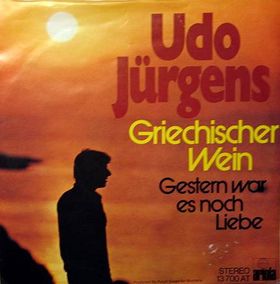 Todd Buchholz in NYT, "Germany’s Mediterranean Envy".
Todd Buchholz in NYT, "Germany’s Mediterranean Envy".
“So today Germany has the power and the discipline and yet still feels bad for its neighbors. Germans are simply unwilling to sever the emotional bond they feel with their unhurried but passionate brothers and sisters to the south. During Oktoberfest, Germans in biergartens will lift a glass and sway arm in arm to a popular, schmaltzy German tune called ‘Griechischer Wein’ (‘Greek Wine’). Haunting and rousing, the lyrics compare Greek wine to the ‘earth’s blood.’ The German narrator spies a group of Greek men drinking together and longs to be with them. He doesn’t even have to ask, for the dark-eyed men stand up and invite him to join them. Despite a history of proclaiming their superiority, deep down Germans are not sure they’ve got it right, after all.”
***
Christopher Caldwell in Weekly Standard, "Merkel didn’t say yes and can’t say no".
“European leaders’ preferred solution of last resort — a eurobond that would turn Greece’s debts into Germany’s — is highly unpopular in Germany. To understand why today’s Germans object to eurobonds is not hard — you have only to understand why Americans of the 1980s, rightly or wrongly, objected to welfare fraud. This being Europe, popular opposition normally poses few obstacles to the country’s governing classes. But the conviction is growing in Germany that even the modest European bailouts that have taken place thus far are outright illegal. And they are.”
***
Honor Mahony at EUobserver.com, "Angry Germans".
“The core of his anger was reserved for what he sees as blatant rule-breaking (on central bank funding of governments, banned in the treaty) and potential inflation-inducing actions of ECB chief Jean-Claude Trichet. For Kerber, Trichet’s bond-buying actions are similar to the Reichsbank printing money during the Weimar Republic, a time of hyperinflation that still influences popular thinking today…. While Germany’s loan guarantees to the European Financial Stability Facility (EFSF) have been put at €211bn, Kerber suggests the real figure is almost €400bn once all costs and guarantees have been counted. Naturally, he is completely opposed to fiscal union but suggests that “we are getting a fiscal state through the European Financial Stability Facility. The sums at stake are so enormous they concern the solvency of the state.”
***
WSJ: "Vladimir the Eternal".
“The timing of this switch is slightly surprising, and perhaps revealing. Kremlinologists expected Mr. Putin to wait until after December’s parliamentary elections to show his cards. The early move suggests some vulnerability. Security and business elites are bickering openly. So Mr. Putin seems to have decided that he needed to re-assert his authority over the boyars and end any uncertainty over who will run Russia in the future.”
***
Alexandr Kolyandr & Richard Boudreaux in WSJ, "Finance Minister Defies Kremlin".
“Finance Minister Alexei Kudrin had earned the respect of investors by running a string of fiscal surpluses in the boom years of Mr. Putin’s first two presidential terms and then stashing oil-export windfalls into a stabilization fund that eased the shock of the 2008 financial crisis. He was said to be angling for the prime minister’s job under a new Putin presidency. But on Saturday, Mr. Putin and President Dmitry Medvedev said they had agreed to switch jobs after the March presidential election, which their United Russia party is almost certain to win. In a rare public breach with the Kremlin, Mr. Kudrin told reporters hours later that his policy disagreements with Mr. Medvedev ‘will not allow me to be a part of the new government.’”
***
Jonathan Ree in New Humanist, "Varieties of irreligious experience".
“When St Paul talked about ‘atheists’ (‘strangers … without God in the world’) he did not mean unbelievers, but traditionalists who had not heeded the gospel of Christ; and Christians got a dose of their own semantic medicine when they found themselves arraigned as ‘atheists’ under the provisions of Roman law. There is a parallel with anarchism – a term which, until its adoption by Pierre Proudhon in the 1840s, was always used to disparage rather than describe. Take the contrarian poet Percy Shelley: today he might well be classified as an anarchist, but he himself would have repudiated the description.”
***
Francesca Murphy in First Things, "Oriental Aspects of Occidental Faith".
“Attraction to what once would have been called Oriental religion, Chesterton insisted, comes not from an excess, but from a failure of imagination. It takes real imagination, he asserted, to see the homely and familiar, or what our grandmothers taught us, as redolent with wondrous, religious appeal. That was true of those of Chesterton’s contemporaries who went for ‘Madame Blavatsky religion,’ pseudo-Buddhism, and the cornucopia of fake orientalisms generated by the British Raj.”
***
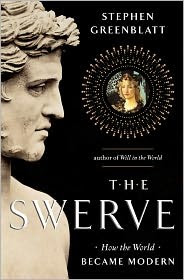 Eric Ormsby in WSJ on Stephen Greenblatt’s book, The Swerve: How the World Became Modern.
Eric Ormsby in WSJ on Stephen Greenblatt’s book, The Swerve: How the World Became Modern.
“Though Poggio was responsible for many priceless finds — the works of Vitruvius and Quintilian, the letters of Cicero — it was thanks to his discovery in 1417 of the sole surviving manuscript of the Roman poet Lucretius' On the Nature of Things that, in Mr. Greenblatt's phrase, ‘the world swerved in a new direction.’ The notion of the ‘swerve’ is taken from Lucretius, who lived in the first century B.C. and taught that the world, uncreated but infinite in extent, is composed of nothing but atoms and the void. These atoms are in perpetual motion, but sometimes they swerve, and this swerve — what Lucretius called the ‘clinamen’ — accounts not only for change in general but for the forms that develop in nature. Mr. Greenblatt expands Lucretius' term to designate Renaissance art and thought itself, startled into new life by the rediscovered freshness of the past.”
***
Aubrey Belford in NYT, "Borneo Tribe Practices Its Own Kind of Hinduism".
“Under the dictatorship of Suharto, from 1968 until his forced resignation in 1998, the government promoted mainstream religions as a counterbalance to communism, while seeing tribal religions as an impediment to modernization. Government rules require an official religion to have a holy book, so Dayak leaders in Central Kalimantan created one, the Panaturan. A clergy was needed, so priests were trained. Religious rituals once held in fields and homes were transformed and placed inside new worship halls, called Balai Basarah.”
***
Aymenn Al-Tamimi at Meforum.org, "Kurdish-Christian rivalries".
“Alawites, who have incorporated Christian practices into their syncretic, Shi'a-rooted religion such as the celebration of Christmas and wearing of crosses, have always felt an affinity with Syrian Christians and have thus protected them since the establishment of the Baathist regime in 1963. Less widely noticed, however, is the problem of tensions between the country's traditionally marginalized Kurdish minority and the Christians. Several aspects of the Kurdish-Christian animosities have recently been documented by Dutch journalist Wladimir Van Wilgenburg. Specifically, disclosures from the U.S. diplomatic cables released by Wikileaks reveal that Christians in the northeastern region of al-Jazirah consider the Kurds to be recent intruders, and fear that the Kurdish presence could lead to the formation of a Greater Kurdistan.”
***
 Alex Rodriguez in LAT, "Pakistan’s unlikely storyteller of the Swat Valley".
Alex Rodriguez in LAT, "Pakistan’s unlikely storyteller of the Swat Valley".
“For the next two years, Ahmad worked on his novel. He hewed his characters from the tribal badlands, where Pashtun society has always been demarcated by strict codes of honor, yet where the region's remoteness and anarchic economy made smuggling, snitching and kidnapping routine occupations. He wrote about the harsh beauty of the Baluch desert, the stoning of adulterers, and a market where men shopped for women with the casualness of browsing for furniture. Thirty-eight years would pass before the publication of ‘The Wandering Falcon,’ a collection of interwoven stories that is quickly making the 80-year-old retired bureaucrat Pakistan's unlikeliest literary star.”
***
Christopher Hitchens at Slate.com, "Pakistan Is the Enemy".
“As for Pakistan's arrogant and insufferable riposte, to the effect that this is all part of its tender concept of its own ‘internal affairs,’ it barely adds insult to injury. On Sept. 12 , 2001, the United Nations Security Council unanimously passed Resolution 1368, condemning the attacks on American soil and asserting the universal right of self-defense. The terms of the resolution explicitly state that those found to be ‘supporting or harboring the perpetrators, organizers and sponsors of these acts will be held accountable.’ This unambiguous language, which secured the votes of Muslim countries like Bangladesh and Tunisia as well as those of the five permanent members of the Security Council and many other nations, deserves to get more repeated exposure than it has been receiving. Pakistan's provision of a military safe-house for the leader of al-Qaida is as comprehensive a breach of the spirit and letter of Resolution 1368 as could be imagined. Meanwhile the Haqqani gang, operating in open collaboration with the Taliban of Mullah Omar as well as other insanitary forces, easily meets the definition of an organization that helps sponsor and succor the original perpetrators. Mullen's evidence, then, is one of those revelations that appears to necessitate action. Either the Pakistanis must permit an unobstructed run at the Haqqani bases that are used for the subversion of Pakistan as well as the re-Talibanization of Afghanistan, or they must at the very least lose their claim on the U.S. Treasury.”
***
 Koert Debeuf at EUobserver.com, "Have we lost Turkey?".
Koert Debeuf at EUobserver.com, "Have we lost Turkey?".
“During our discussion he told an even more astonishing story. Along with 59 other young leaders from the April 6 Movement, he was invited some weeks ago to visit Turkey. Not for tourism though. They met with PM Erdogan, with President Gul, with foreign minister Davutoglu and many more. These very busy top politicians took their time and spoke freely of what their plans were for the future. Their message was that they want to create a new alliance between Turkey, Egypt and Iran. Turkey would invest a lot in Egypt, hoping for friendship and a big new market for its booming economy. What they are planning to do with Iran is less clear. But it is obvious that these three countries are in military and economic terms by far the strongest in the region. ‘By the way,’ he told me, ‘You in the West look differently at Iran than we do. For us it is a strong country.’ The fact that Turkish leaders personally told him all makes the story all the stronger.”
***
Anthony Shadid in NYT, "In Riddle of Mideast Upheaval, Turkey Offers Itself as an Answer".
“No one is ready to declare a Pax Turkana in the Middle East, and indeed, its foreign policy is strewn this year with missteps, crises and gains that feel largely rhetorical. It even lacks enough diplomats. But in an Arab world where the United States seems in retreat, Europe ineffectual and powers like Israel and Iran unsettled and unsure, officials of an assertive, occasionally brash Turkey have offered a vision for what may emerge from turmoil across two continents that has upended decades of assumptions.”
***
Neil MacFarquhar in NYT, "Scuffle at the United Nations Ends in an Apology to Turks".
“Mr. Erdogan was having a tête-à-tête with President Jalal Talabani of Iraq on the obscure fourth floor of the General Assembly hall — tiny meeting spaces have been tucked into every nook and cranny because the Secretariat Building is gutted for renovations. Learning that the Palestinian president, Mahmoud Abbas, was making his address demanding full United Nations membership for a state of Palestine, Mr. Erdogan, a big fan, rushed to the nearest entrance to take Turkey’s seat on the main floor. But the fourth floor is actually the visitors’ gallery, with no access to the main floor, and it was packed. So a United Nations security guard refused to let the Turkish leader pass. When Mr. Erdogan pressed forward, the guard pushed him (by most accounts), and then a fracas erupted that was audible four flours below. One United Nations guard was taken to the hospital with a rib injury, and there were reports of bloodstains on the floor, although that could not be confirmed. Eventually, after senior United Nations officials rushed over to calm the situation, Mr. Erdogan was directed to the proper entrance. But by then the gauntlet had been thrown down, and minor scuffles erupted wherever he went with his entourage around the United Nations. (There had apparently been some grousing already about the number of black limousines in the prime minister’s entourage.)”
***
TimesofOman.com: "Oman among world’s top 30 nations in economic freedom".
“The top spot in this year’s report, which assesses 141 nations and uses 49 different measures, goes to Hong Kong, followed by Singapore, New Zealand, Switzerland and Australia, said a press release from the Public Authority for Investment, Promotion and Export Development (Paiped). The rankings for the Middle East include Bahrain 11th; UAE, 14th; Oman, 28th (up 15 places from 43rd from last year); Kuwait, 47th; Jordan 62nd; Israel 83rd; Egypt 93rd and Tunisia 94th.”
***
Peter Wonacott in WSJ, "Small Factories Take Root In Africa".
“Why Africa doesn't make more stuff has been an enduring mystery of the global economy. As wages rose in manufacturing powerhouses such as China, many economists predicted that factories would flock to cheaper pools of labor in Africa, helping to spur the same sort of rapid industrial growth that lifted living standards across Asia. It hasn't happened. Africa's economy has averaged solid 5% annual growth over the past decade, thanks to rising commodity prices and new consumer demand. The continent, however, accounts for just 1% of global manufacturing, compared with Asia's 25%. Africa's share of labor-intensive manufacturing — a vital source of jobs for underemployed farmers — is actually shrinking, according to a July United Nations report. The situation so alarmed the World Bank that it began talks with Chinese trade officials on how to move more factories to Africa from China, according to World Bank President Robert Zoellick. The bank estimates there are now 85 million manufacturing jobs suited for unskilled workers in China, out of a population of 1.3 billion, but only 10 million in all of Africa, population 1 billion.”
***
 Jeffrey Gettleman in NYT, "Opposition Leader Is Handed Reins in Zambia".
Jeffrey Gettleman in NYT, "Opposition Leader Is Handed Reins in Zambia".
“The Zambian opposition leader Michael Sata, a 74-year-old veteran politician who had whipped up not-so-subtle anti-Chinese sentiment (China runs several big mines in Zambia), handily won the presidency in election results announced Friday. The newly elected president, Michael Sata, released a dove in Lusaka on Friday. Rupiah Banda, whose party had ruled for 20 years, was voted out. It was a rare example in Africa of an opposition candidate’s cruising to victory and, perhaps more important, the incumbent’s graciously admitting defeat.”
***
Jeremy Page & Tom Wright in WSJ, "India Faces Standoff With China On Sea Oil".
“The Indian government responded to the latest Chinese warnings Thursday by repeating its pledge to continue exploring for energy in the South China Sea, where China is embroiled in territorial disputes with Vietnam, the Philippines, Taiwan, Malaysia and Brunei. ONGC, meanwhile, said it planned to resume drilling next year at one of its two remaining blocks in the area, after suspending work there because of a hard seabed, and after relinquishing another block last year because it lacked production potential. Disputed Isles Competing territorial claims have led to maritime disputes off the coast of Asia. ‘We plan to restart drilling there,’ said ONGC Chairman A.K. Hazarika. ‘The [Indian] Ministry of External Affairs has informed us that the block is well within the territory of Vietnam and so there are no issues with exploration there.’ The testy public exchanges follow an unusual incident in July when, according to the Indian government, an Indian navy ship visiting Vietnam as part of expanding bilateral defense ties received a radio message warning it that it was entering Chinese waters. China has dismissed India's version of the incident as ‘groundless.’”
***
Radu Botez at Opendemocracy.net, "India’s advances into South China Sea met with criticism from Beijing".
“Yet as an article published earlier this year by The Diplomat, an online magazine, points out, India has quietly sought to counter China’s moves by seeking stronger ties with countries in east and south-east Asia, among which ‘Vietnam is ideally placed to help counter China's expansion into the South China Sea. With this in mind, and for the past decade, India has been providing Vietnam with assistance in beefing up its naval and air capabilities in an attempt to deny China supremacy in the South China Sea.’ However, not only do both countries lack the necessary naval capabilities to effectively project power into the other’s alleged sphere of influence – the Indian Ocean and the South China Sea – but such power projection with potentially devastating consequences is far from being a priority for either New Delhi or Beijing. China’s focus, for instance, is still on Taiwan and potential contingencies, including US intervention, there. The risk related to events such as the recent spat is that it might lead to a tit-for-tat dispute between the actors involved, and initiate a downward spiral in relations; while Krishna was still visiting Hanoi, China announced it would expand its exploration, under the permission of the International Seabed Authority (ISA) granted earlier this year, of 10,000 square kilometres of seabed in the Indian Ocean.”
***
Andrew Jacobs in NYT, "Farmers in China’s South Riot Over Seizure of Land".
“Last week, hundreds of residents protesting environmental contamination by a solar panel factory in Zhejiang Province stormed the factory and destroyed office equipment and vehicles. Weeks earlier, 12,000 people peacefully gathered in the city of Dalian to demand the closure of a chemical factory. In Lufeng, the protests were just the most dramatic manifestation of a long-running battle over land that residents say their ancestors reclaimed from the sea. According to a local Web site, the Lufeng city government has already sold off more than 800 acres of the property for industrial parks and high-priced housing. The proffered compensation per acre, villagers said, has been barely enough to buy a new bed. ‘Wake up, my neighbors, if we don’t unite now, the land of our ancestors will be sold off to the last square meter! If we don’t unite now, our children will be homeless!’ read one posting on the site. ‘We will have no where to bury our parents or raise our children!’ Municipal governments, which own all land in China, largely depend on sales of long-term property leases to fill their operating budgets. In many cases, private real estate companies collude with officials to clear and develop the land as quickly as possible.”
***
Tom Orlik in WSJ, "China Unrest Grows Amid Boom".
“Yu Jianrong, an expert on civil unrest at the Chinese Academy of Social Sciences, wrote in 2010 that disputes over land were behind 65% of social disturbances in China’s countryside. That number could climb China’s local governments have spent the past three years amassing debt -- 10.7 trillion yuan according to a June estimate by the National Audit Office. Concerns are mounting about whether local governments can repay that debt. This month, local media reported that 85% of local-government borrowers in Liaoning, a province in North East China, didn’t have sufficient revenue to make interest payments. Why did the banks make so many loans to projects with little hope of repayment? One word: land. According to the National Audit Office, 2.5 trillion yuan of loans to local government -- 23% of the total -- depend on sales of land for repayment. Some analysts say the real percentage is much higher. Not all the farmers about to be removed from their land or residents about to be turned out of their apartments will go quietly.”
***
Tom Orlik in WSJ, "Taking a Look Behind the Strong Façade of Chinese Banks".
“Bad debts from two years of reckless lending are starting to come home to roost. Recent reports from Liaoning — a province in northeastern China — revealed that 85% of local government-backed borrowers missed debt-service payments in 2010. The easy answer to those concerns is that China's banks are strongly capitalized. Tier 1 capital ratios–a measure that compares risk-weighted assets to banks' own capital to assess their resilience to losses — are above 9% for all of the big four banks. That suggests they are well placed to weather the storm. But capital is a regulatory construct and different measurements produce different results. In particular, capital ratios for China's banks are flattered by large volumes of loans to big state-backed enterprises, which carry a low risk weighting. A different measure of capital adequacy, comparing total equity with total assets, suggests China's banks are rather less secure.”
***
Rebiya Kadeer in WSJ, "China’s Double Game on Terrorism".
“Within days of 9/11, China’s official Xinhua news agency was lauding the attacks as a ‘humbling blow’ against America, a theme that continued this anniversary year, even as Beijing’s propagandists complained about Washington’s ‘blind eye’ toward the conflict in the Uighur region. Clearly, China does not object to rooting out terrorist groups as long as it is allowed to define who the terrorists are. Meanwhile, China has skillfully taken advantage of the West’s ignorance of Uighur history and culture to insert itself into the antiterrorist camp.”
***
Jacob Zenn at Atimes.com, "Catch-22 of Xinjiang as a gateway".
“Uyghur concerns about China's unbalanced development are roughly the same as those of China's Han majority, but in Xinjiang these concerns take on an added ethnic dimension. The problem boils down to representation. In ‘neidi’, or Inner China -- the term Xinjiang's Uyghurs use to refer to the Han-majority interior of the country -- the Han Chinese have begun protesting government land seizures on a scale unseen before in China's history.”
***
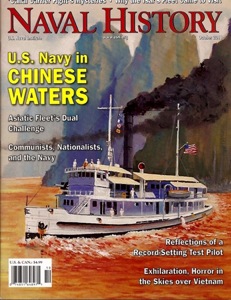 Edward Marolda in Naval History, "Asian Warm-Up to the Cold War".
Edward Marolda in Naval History, "Asian Warm-Up to the Cold War".
“During the first four years of the Cold War, the 7th Fleet called the naval base at Tsingtao home. The port had served as a Far Eastern outpost of the Germany’s navy until a Japanese force seized it at the outset of World War I. On 11 October 1945, fleet ships landed the 6th Marine Division at Tsingtao and shortly afterward the new commander 7th Fleet, Vice Admiral Barbey, established the Chinese Naval Training Center to prepare Nationalist Chinese sailors. By 1946, 7th Fleet commanders regarded Tsingtao as the fleet’s primary anchorage in China, with responsibilities for training Chinese sailors, transferring surplus ships and craft to them, and managing an airfield. During 1947, Mao’s communist forces became increasingly hostile toward Marines stationed in North China and the naval personnel at Tsingtao.”
***
Justin Lahart in WSJ, "Tallying the Toll of U.S.-China Trade".
“For years, economists have told Americans worried that cheap Chinese imports will kill jobs that the benefits of trade with China far outweigh its costs. New research suggests the damage to the U.S. has been deeper than these economists have supposed. The study, conducted by a team of three economists, doesn't challenge the traditional view that trade is ultimately good for the economy. Workers who lose jobs do eventually find new work or retire, while the benefits from trade, such as lower prices, remain. The problem is the speed at which China has surged as an exporter, overwhelming the normal process of adaptation.”
***
Ann Marlowe in WSJ, "The Truth About Who Fights for Us".
“Why do myths persist despite all the evidence? One reason is lack of firsthand exposure to the military: Doing a journalistic embed with American troops or visiting a U.S. military base — or simply having some friends in the military — would disabuse my acquaintances of their beliefs. This detachment is the result of a withdrawal of our urban elites from military service. And it suits the interests of many members of the urban elite to believe that the military they do not join is composed of poor, uneducated victims of an unfair society. The hidden assumption in this myth is that an institution that is heavily black is an inferior institution. The myth of the ghetto Army is as nastily racist as it is false.”
***
Paul Stillwell in Naval History, "‘Exploring the Unknowns’ at Mach 2.1".
“Stillwell: The thought was that people would be killed at that speed, it wasn’t achievable.
Lawrence: Well, that’s right. Everybody visualized a wall that you had to punch through. Of course, the early breed of airplanes, like the F9F-6 Cougar, had basically a thick wing. The thicker the wing, the more shock waves would be developed on there as the airflow became supersonic over the wing. So it was, literally, like hitting a brick wall, because as the shock waves developed on the wing of the airplane, the drag increased significantly. That’s why you see pictures of a guy going supersonic, seeing his head turn around, and all sorts of violent reactions, skidding into the turbine airflow caused by these shock waves. I remember going supersonic in the F9F-6, which was really quite something. You had to go up, turn over, and then point the airplane straight down. Then, of course, when I came over to the flight-test division, I started flying airplanes like the F8U, which you could fly supersonic straight and level.”
***
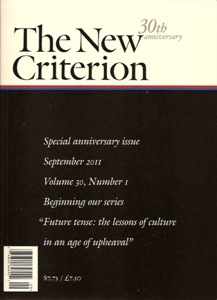 David Pryce-Jones in New Criterion, "The past is a foreign country".
David Pryce-Jones in New Criterion, "The past is a foreign country".
“In the Oxford of my day, Hugh Trevor-Roper and A.J.P. Taylor became national celebrities through sustained displays of these characteristics. The former passed as conservative, the latter as socialist, but such ascriptions were hardly more than nominal. Both leveraged their university positions into financial reward and fame in the media. In their wake, a host of academics have come to believe that writing reviews or articles in the national press is the higher purpose of their career. Soviet apologists and assorted Marxists have also exemplified the dead-end into which obsession with doctrine leads. In 1966, after a lifetime of consistent mendacious denial of Communist reality, E.H. Carr could write about the Soviet Union, ‘I suppose I’ve rather by-passed the horrors and brutalities and persecution,’ going on to add, ‘but then I’m a historian, not a politician.’ He and Communists such as Christopher Hill, E.P. Thompson, Raymond Williams, and E.J. Hobsbawm are not historians in any real sense -- they merely issue certificates to approve whatever part of Marx’s pre-ordained schema concerns them. Their imitators and successors, the likes of Noam Chomsky or Edward Said, select facts only to dramatize uncontrollable psychological compulsions. The politicization of historiography has come to be treason to truth itself.”
***
Felicity Barringer in NYT, "Publisher of an Atlas Is Scrambling to Refreeze Greenland".
“‘Fiasco’ was the word chosen by one scientist in an e-mail to the National Snow and Ice Data Center in Boulder, Colo., alerting his colleagues to erroneous claims made by the publishers of the atlas (whose name derives from The Times of London) about the speed at which Greenland’s glaciers are melting. He also feared that a map in the atlas, along with news accounts repeating an error in the news release, could pull climate scientists into another vortex of damaging controversy. The news release, echoed by the news media, claimed that Greenland had lost 15 percent of its permanent ice cover from 1999 to 2011. That translates to 125,000 cubic miles, according to a rough calculation by Etienne Berthier, a glaciologist with the University of Toulouse, enough melted ice to raise sea levels three to five feet.”
***
James Taranto at WSJ.com, "Still Not Getting the Joke".
“Third, is the lack of a sense of humor a job requirement for the vice chancellor for equality and inclusion? This is a very old joke. As best we can tell, the first ‘affirmative action bake sale’ took place in February 2002 at the University of New Mexico. It wouldn't be funny anymore except that people like Basri make such good foils. Come to think of it, so does the New York Times. The headline of this story is ‘A 'Diversity Bake Sale' Backfires on Campus.’ Backfires? It got the College Republicans attention and stirred up the debate, which was exactly what they were looking for. They even got into the New York Times!”
***
WSJ: "Inside the EPA".
“Amid these sacrifices on the anti-carbon altar, Alaska Republican Lisa Murkowski and several House committees have been asking, well, what happens after as much as 8% of U.S. generating capacity is taken off the grid? A special focus of their inquirey has been the Federal Energy Regulatory Commission, or FERC, which since 2005 has been charged with ensuring that the (compact florescent) lights stay on. That 8% figure comes from FERC itself in a confidential 2010 assessment of the EPA’s regulatory bender -- or about 81 gig watts that FERC’s Office of Electric Reliability estimated is ‘very likely’ or ‘likely’ to enter involuntary retirement over the next several years. FERC disclosed the estimate in August in response to Senator Murkowski’s questions, along with a slew of memos and emails. FERC Chairman Jon Wellinghoff, a Democrat, has dince disavowed the study as nothing more than back-of-the-envelope scribblings that are now ‘irrelevant,’ as he told a recent House hearing. OK, but then could FERC come up with a relevant number? Since he made the study public, Mr Wellinghoff has disowned responsibility for scrutinizing the EPA rules and now says that FERC will only protect electric reliability ex post facto once the rules are permanent, somehow.”
***
Matt Ridley in WSJ, "From Phoenecia to Hayek to the ‘Cloud’".
“Knowledge is dispersed and shared. Freidrich Hayek was the first to point out, in his famous 1945 essay ‘The Uses of Knowledge in Society,’ that central planning cannot work because it is trying to substitute an individual all-knowing intelligence for a distributed and fragmented system of localized but connected knowledge. So dispersed is knowledge, that, as Leonard Reed famously observed in his 1958 essay ‘I, Pencil,’ nobody on the planet knows how to make a pencil. The knowledge is dispersed among many thousands of graphite miners, lumberjacks, assembly line workers, ferrule designers, salesmen and so on. This is true of everything that I use in my everyday life, from my laptop to my shirt to my city. Nobody knows how to make it or to run it. Only the cloud knows.”
***
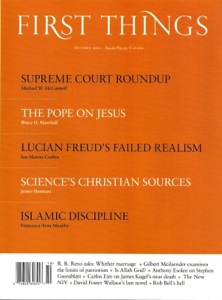 James Hannam in First Things, "Modern Science’s Christian Sources".
James Hannam in First Things, "Modern Science’s Christian Sources".
“Consequently, we should be skeptical about some of the claims made for Islamic science in recent television shows and books, not to mention Wikipedia. Unfortunately, the misattribution of scientific advances to Islamic sources has sometimes been the fault of the very pioneers who discovered them. Alchemy is a case in point. During the Middle Ages, Christian alchemists would write their treatises under the name of the fabled Arab savant Geber. Later historians mistakenly assigned developments such as the first production of powerful acids as well as the isolation of alcohol to Geber himself. Alcohol was even assigned an Arabic name by Christian authors. We now know that Geber probably did not write any of the works attributed to him. There was one towering exception to the rule that early science tended to fail. Both the Greeks and Arabs excelled in mathematics. This was because pure rationalism works a treat when it is restricted to geometry and arithmetic. The imams had plenty of uses for math as well: The Muslim calendar follows the lunar, not the solar year, and mosques had to be oriented toward Mecca. Both these religious problems required mathematical solutions.”
***
Steven Pinker in WSJ, "Violence Vanquished".
“Today the decline in these brutal practices can be quantified. A look at the numbers shows that over the course of our history, humankind has been blessed with six major declines of violence. The first was a process of pacification: the transition from the anarchy of the hunting, gathering and horticultural societies in which our species spent most of its evolutionary history to the first agricultural civilizations, with cities and governments, starting about 5,000 years ago. For centuries, social theorists like Hobbes and Rousseau speculated from their armchairs about what life was like in a ‘state of nature.’ Nowadays we can do better. Forensic archeology — a kind of ‘CSI: Paleolithic’ — can estimate rates of violence from the proportion of skeletons in ancient sites with bashed-in skulls, decapitations or arrowheads embedded in bones. And ethnographers can tally the causes of death in tribal peoples that have recently lived outside of state control.”
***
Paul Beston in City Journal, "The Ghost Sport".
“Boxing’s beginnings in America go back to slave days, when plantation owners pitted slaves against one another and wagered on the outcomes. One freed slave, Tom Molineaux, even fought overseas against the British champion, Tom Cribb — and probably would have won their 1810 match, had Cribb’s desperate supporters not intervened just as Molineaux seized a decisive advantage. Boxing then was conducted with bare fists, under the old London Prize Ring Rules, which stipulated fights to the finish — that is, until one man could not continue. The rules also permitted wrestling holds and other tactics, and rounds ended only with ‘falls,’ when one man went down, whether from a punch or a throw or sheer exhaustion. Before the Civil War, boxing enjoyed a brief vogue in New York, where fighters often associated with the Tammany Hall machine rose to prominence. But the war interrupted the sport’s momentum.
Only with the emergence of its first great figure, John L. Sullivan, did boxing truly arrive in America.”
***
 Dave Kehr in NYT on "Treasures 5: The West, 1898-1938".
Dave Kehr in NYT on "Treasures 5: The West, 1898-1938".
“The emergence of the new medium coincided with the passing of the Old West — a happenstance that, as the films in this collection frequently suggest, may also contain a complex web of cause and effect. The oldest footage in the collection is a two-shot Edison actuality film of 1898, showing a passenger train — the Southern Pacific’s Sunset Limited — gliding through a desert landscape. A thrilling (if brief) entertainment that was originally shown in vaudeville houses, the film is also a commercial, both for the railroad (the filmmakers have helpfully placed a placard reading ‘Sunset Limited’ in the foreground) and for the Western landscape. Now safely pacified, the wide-open spaces were being offered as a tourist attraction for the hemmed-in urbanites of the East.”
***
Archie Patterson’s 2-hr special on The Move from last Thursday on Alejandro Ceballos’ KBOO program.
***
How much do musicians earn online? At Informationisbeautiful.net.
***
Rob Young in London Review of Books on Peter Vergo’s book, The Music of Painting: Music, Modernism and the Visual Arts from the Romantics to John Cage.
“Vergo begins by showing how music, or the discourse surrounding it, helped painters legitimise the new abstraction of the late 19th and early 20th centuries. He undercuts various myths along the way. Whistler’s early 1870s Nocturnes are frequently cited as counterparts to Chopin‘s mood pieces. In fact, as Vergo documents, Whistler didn’t know anything about classical music, preferring music hall songs, and it wasn‘t his idea to call the paintings Nocturnes, but that of his patron Frederick Leyland.”
***
Bruce Kalberg addendum:
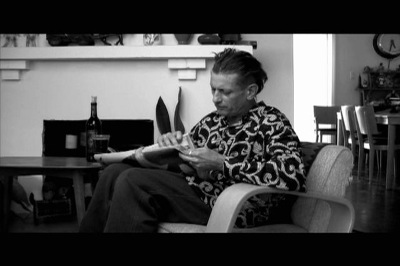
There is unaccountably (as of Thurs.) still no obituary for Bruce in the LA papers and since the Times’ Ann Powers’ email no longer accepts the NV, and since Paul Cullum, who’s written (fancifully, I’m told) about Bruce for the L.A. Weekly, requested off my list at my first New Deal kvetch long ago, they may not know. The news did get out via Ewa, Vale, Metaljazz.com, and here.
from Ewa Thursday:
Bruce Kalberg died on September 17 of Leukemia.
There will be a memorial for him on
Sunday, October 9, 5pm
1901 Echo Park Ave., Los Angeles 90026
Frequent NV contributor Steve Beeho writes:
“Joe, I was saddened to read about Bruce's passing. I also kept the emails he sent me because they were hilarious. I remember how in one of them he complained about the lack of headway being made on his Sub-Hollywood website which he attributed to the ‘digital slugs’ he'd hired, and signed off by saying he was also copying the email to one of the aforementioned digital slugs which he did. This is the Sub-Hollywood site. I think work on it may have ground to a halt after more pressing matters took precedence. Although ironically the spiel on his myspace site is far more entertaining, especially when you scroll down. - Steve”
I recommend Bruce’s novel, Sub-Hollywood, and you can check James Parker’s take on it in the Boston Phoenix here; he paired Kalberg/Caen’s novel with the Minutemen doc, We Jam Econo.
I made no correction on last week's reference to the British comp "Black Hole" since The Urinals don’t use “Black Hole” in their tune as a metaphor for Los Angeles, or California, as Jon Savage does. Their song is about an internal threat of depression I think. Without the Adolescents tune “Kids of the Black Hole” Jon’s fine overdue introductory compilation of California punk for the UK market would probably have been called “California Uber Alles.” Though its probable that Rikk Agnew was using “Black Hole” as a specific metaphor for Orange County, and The Middle Class are the only OC band on the comp (whose Mike Patton produced the Adolescents LP). I’m glad someone was sending Savage those great records, I know that we at Systematic had to shame Geoff and Richard at Rough Trade to take even fives for their shop. They would not import and distribute the way we were from them. Overdue, as I said.
***
Obituaries of the Week
• Johnny Wright (1914 - 2011)
“They married on Oct. 30, 1937. Deason had just turned 18, and Mr. Wright worked at the Davis Cabinet Company, making $13 a week. Deason made less than that, folding and ironing shirts at the Washington Manufacturing Company to help make ends meet. In 1938, Mr. Wright's duo partner, Jack Anglin, married Mr. Wright’s sister, Louise, who sang backing vocals with Deason as ‘Johnnie Wright & The Harmony Girls’ on WSIX radio in Nashville. Soon, Mr. Wright was performing with Anglin as Johnnie & Jack, with Deason on harmony vocals. Anglin’s military stint halted that, and Mr. Wright worked for a time as a band leader, hiring young Chet Atkins to play fiddle. Upon Anglin’s 1946 discharge, Johnnie & Jack was back in business, working at a radio station in Raleigh, N.C. The duo’s recording career began in 1947, the same year the group was offered a place on the Grand Ole Opry (they soon left the Opry in favor of the Louisiana Hayride show)…. In 1952, Deason was working, though sporadically, as ‘Kitty Wells,’ a name Mr. Wright drew from the folk ballad, ‘Sweet Kitty Wells.’ She had decided to give up her professional singing in favor of full-time homemaking. Hank Thompson’s ‘Wild Side Of Live’ was a 15-week No. 1 hit that year, and a songwriter named J.D. Miller had penned an ‘answer’ song called ‘It Wasn’t God Who Made Honky Tonk Angels.’”
• Jessy Dixon (1938 - 2011)
“Mr. Dixon was leader of the Chicago Community Choir, an offshoot of the beloved Thompson Community Singers from the city’s far West Side. He believed songs came to him in dreams. ‘That’s why I usually sleep with a tape recorder in bed,’ he said in 2002. ‘Somebody is singing in the dream and it is generally not me.’ The colorful gospel singer was born in San Antonio, Texas, where his father was a barber and tailor. Mr. Dixon moved to Chicago when he was a teenager. He was minister of music at Omega Baptist Church, 45th and State, when Willie Dixon (no relation) brought him into Chess as a session player. Mr. Dixon played a Chicago 1/3/5 chord gospel that was more bluesy than the jazz-influenced Detroit or Los Angeles gospel. He had no problem with the age-old conflict of playing gospel and secular at the same time at Chess. ‘I never heard the lyrics,’ he said in 2002. ‘I’d play on sessions and the singer wasn’t there. I read music, the charts would be there and off I’d go. I never played live secular music until I got with Paul Simon.’”
***
Thanks to Jay Babcock, Mike Safran, Steve Beeho.
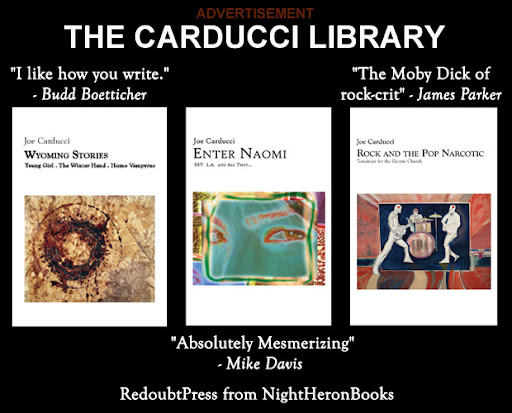
To receive a weekly update notice for the NV, send an email to newvulgate[at]sbcglobal.net with SUBSCRIBE in the subject line. To stop receiving notices, do the same with the word UNSUBSCRIBE.
• The New Vulgate
• Joe Carducci, Chris Collins, James Fotopoulos, Mike Vann Gray, David Lightbourne
• Copyright retained by the writer, artist, or photographer


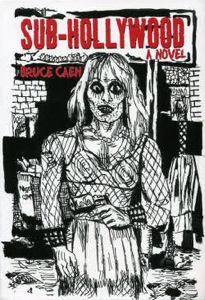 Most of what I know about Bruce I take from
Most of what I know about Bruce I take from  When the Slash magazine people took in a new partner the dude decided to turn off the magazine and concentrate on the record label which at that point had released 45s by the Plugz and the Germs, and the Germs (GI) album which came out in 1979. The most important record label in Los Angeles and hence the world at that point was Dangerhouse, but Slash was the most important publication extant by an even wider margin. It’s end made Bruce’s
When the Slash magazine people took in a new partner the dude decided to turn off the magazine and concentrate on the record label which at that point had released 45s by the Plugz and the Germs, and the Germs (GI) album which came out in 1979. The most important record label in Los Angeles and hence the world at that point was Dangerhouse, but Slash was the most important publication extant by an even wider margin. It’s end made Bruce’s  Last year Bruce and his longtime friend Ewa (she novelized well) organized a conference of small publishers at USC where she teaches so I got to see him there again. I don’t imagine Bruce would’ve been invited to that had Ewa not been involved. And yet he was the rarest of bohemes, the funniest and the one you were glad the younger folks attending got to glean from. With
Last year Bruce and his longtime friend Ewa (she novelized well) organized a conference of small publishers at USC where she teaches so I got to see him there again. I don’t imagine Bruce would’ve been invited to that had Ewa not been involved. And yet he was the rarest of bohemes, the funniest and the one you were glad the younger folks attending got to glean from. With 

 Steve Sailer at
Steve Sailer at 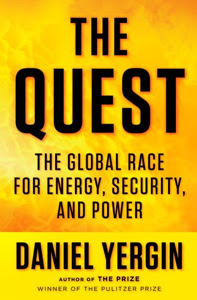 Daniel Yergin in
Daniel Yergin in  Arvind Subramanian in
Arvind Subramanian in  Andrew Jacobs in
Andrew Jacobs in  Michael Collins at
Michael Collins at 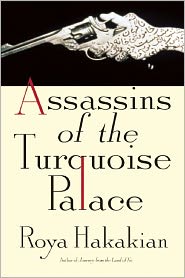 Caroline Moorehead in
Caroline Moorehead in  Ellen Bork in
Ellen Bork in  Donald Morrison in
Donald Morrison in 